

Needlogin?type=login&redirecturl=http%3A%2F%2Fwww.desmoinesregister.com%2Fapps%2Fpbcs. Philippines Typhoon Haiyan. “Making sure people have clean water, food and safe sanitation is our immediate priority.”
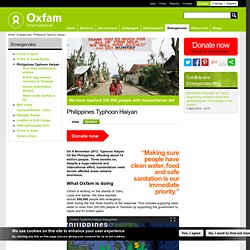
On 8 November 2013, Typhoon Haiyan hit the Philippines, affecting about 14 million people. Three months on, despite a huge national and international effort, humanitarian need across affected areas remains enormous. What Oxfam is doing Oxfam is working on the islands of Cebu, Leyte and Samar. We have reached almost 550,000 people with emergency relief during the first three months of the response. Sudan: 'Food Shortages and Suffering for 129,000 Displaced in South Darfur' - Commissioner. Girayda — The Commissioner of Humanitarian Aid for Girayda locality in South Darfur, El Tayeb Suleiman, has acknowledged that more than 129,000 displaced persons in the locality are facing "a shortage of food and real suffering".
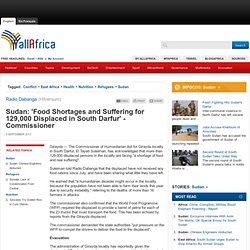
Suleiman told Radio Dabanga that the displaced have not received any food rations since July, and have been sharing what little they have left. He warned that "a humanitarian disaster might occur in the locality, because the population have not been able to farm their lands this year due to security instability," referring to the deaths of more than 16 farmers in attacks.
The commissioner also confirmed that the World Food Programme (WFP) required the displaced to provide a barrel of petrol for each of the 23 trucks that must transport the food. This has been echoed by reports from the Girayda displaced. The commissioner demanded the state authorities "put pressure on the WFP to compel the drivers to deliver the food to the displaced".
Evacuation Teachers. Shortages reach crisis levels in China. Children carry bottled drinking water home in Yunnan province earlier this year.
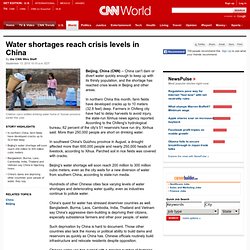
In northern China, farm fields have developed cracks up to 32.8 feet deepBeijing's water shortage will soon reach 200 million to 300 million cubic metersBangladesh, Burma, Laos, Cambodia, India, Thailand and Vietnam say China is hijacking riversChina's dams are depriving other countries' poor people of water, they say Beijing, China (CNN) -- China can't dam or divert water quickly enough to keep up with its thirsty population, and the shortage has reached crisis levels in Beijing and other areas. In northern China this month, farm fields have developed cracks up to 10 meters (32.8 feet) deep. Farmers in Chifeng city have had to delay harvests to avoid injury, the state-run Xinhua news agency reported. According to the Chifeng's hydrological bureau, 62 percent of the city's 51 reservoirs have run dry, Xinhua said.
[:en]Water Crisis Looming in Pakistan [:es] Se Avecina en Pakistán una Crisis de Agua. Pakistan is on the brink of being classified as a “water scarce” country, according to a report from the Asian Development Bank, which is extremely dangerous for the nation’s residents and businesses.
![[:en]Water Crisis Looming in Pakistan [:es] Se Avecina en Pakistán una Crisis de Agua](http://cdn.pearltrees.com/s/pic/th/water-crisis-looming-pakistan-69594199)
The nation now has only a 30-day supply of water in storage, reports The International News in July 3, 2013, article. Food crisis fears prompt UN wake-up call to world leaders. Governments in rich and poor countries alike should renounce their focus on agribusiness and give more support to small-scale, local food production to achieve global food security and tackle climate change, according to a report from Unctad, the UN trade and development body.
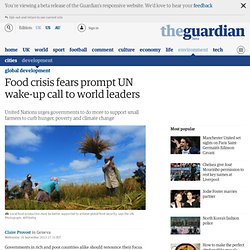
The 2013 Trade and Environment Review, calls on governments to "wake up before it is too late" and shift rapidly towards farming models that promote a greater variety of crops, reduced fertiliser use and stronger links between small farms and local consumers. Persistent rural poverty, global hunger, population growth and environmental concerns must be treated as a collective crisis, argues the report, which criticises the international response to the 2008 food-price crisis for focusing on technical "quick-fixes".
The report warns that urgent and far-reaching action is needed before climate change begins to cause big disruptions to agriculture, particularly in vulnerable regions of poorer countries. UN warns of looming worldwide food crisis in 2013. World grain reserves are so dangerously low that severe weather in the United States or other food-exporting countries could trigger a major hunger crisis next year, the United Nations has warned.
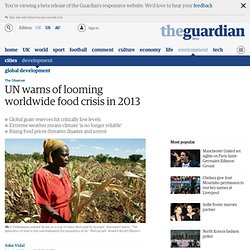
Failing harvests in the US, Ukraine and other countries this year have eroded reserves to their lowest level since 1974. The US, which has experienced record heatwaves and droughts in 2012, now holds in reserve a historically low 6.5% of the maize that it expects to consume in the next year, says the UN. "We've not been producing as much as we are consuming. That is why stocks are being run down. Bonus column: A global call for coordinating food security efforts. Inside Asia - Water Crisis Threatens Asia's Rise. India Kumbh Mela dip 'raised Ganges river pollution' 24 January 2013Last updated at 05:32 ET By Ram Dutt Tripathi BBC Hindi, Lucknow Eight million people bathed at the confluence of the Ganges and Yamuna rivers on 14 January Pollution levels rose alarmingly in the river Ganges in Allahabad on the first day of the Kumbh Mela festival, according to a study by the state pollution control board.
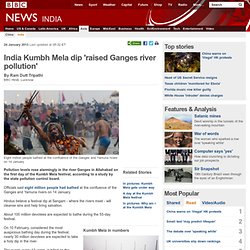
Officials said eight million people had bathed at the confluence of the Ganges and Yamuna rivers on 14 January. Hindus believe a festival dip at Sangam - where the rivers meet - will cleanse sins and help bring salvation. About 100 million devotees are expected to bathe during the 55-day festival. On 10 February, considered the most auspicious bathing day during the festival, nearly 30 million devotees are expected to take a holy dip in the river. The event, every 12 years, is billed as the biggest gathering on Earth. Worst fears. Food Price Watch, July 2013: Prices Continue to Drop, But Food Subsidies a Concern. Prices remain high and with recent price increases in May and June, uncertainties surrounding unstable weather conditions and domestic policy decisions among key food producers warrant close scrutiny.
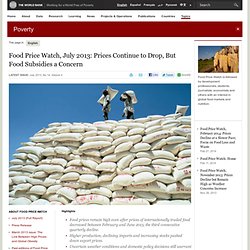
Domestic policies worth watching include public procurement policies, but also consumer price subsidies, which, far from being a thing of the past, continue to be used – even though subsidies often bring meager benefits to the poor, high fiscal costs, corruption episodes and unproven nutritional effects. Recent decisions by the governments of India, Indonesia and Benin to extend consumer food subsidies indicate that such policies remain in vogue. Between the 1950s and 1970s, developing countries used universal food subsidies as major components of their poverty alleviation strategies. Why Are Food Prices So High? New book finds many U.S. foods banned overseas for cancer links.
Put down the Mountain Dew and step away from the Pringles.

HOW FOOD EXPLAINS THE WORLD. Butylated hydroxytoluene. Butylated hydroxytoluene (BHT), also known as butylhydroxytoluene, is a lipophilic organic compound, chemically a derivative of phenol, that is useful for its antioxidant properties.
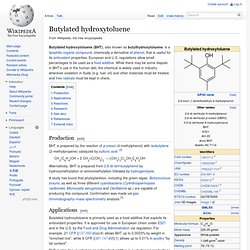
European and U.S. regulations allow small percentages to be used as a food additive. While there may be some dispute in BHT's use in the human diet, the chemical is widely used in industry wherever oxidation in fluids (e.g. fuel, oil) and other materials must be treated, and free radicals must be kept in check. Production[edit] BHT is prepared by the reaction of p-cresol (4-methylphenol) with isobutylene (2-methylpropene) catalyzed by sulfuric acid: [2] Government rejects the science behind neonicotinoid ban.
10 September 2013Last updated at 10:13 ET By Matt McGrath Environment correspondent, BBC News Scientific disputes continue over the impacts of neonicotinoid chemicals on bees The government says it accepts the EU ban on the use of some pesticides linked to bee deaths, but it rejects the science behind the moratorium. Neonicotinoids let virus thrive in bees. Water pollution. Water pollution is the contamination of water bodies (e.g. lakes, rivers, oceans, aquifers and groundwater). Water pollution occurs when pollutants are directly or indirectly discharged into water bodies without adequate treatment to remove harmful compounds. Water pollution affects plants and organisms living in these bodies of water.
In almost all cases the effect is damaging not only to individual species and populations, but also to the natural biological communities. Introduction[edit] Water pollution is a major global problem which requires ongoing evaluation and revision of water resource policy at all levels (international down to individual aquifers and wells). Mining - water, effects, environmental, disasters, United States, impact, EPA, soil, chemicals, industrial, toxic, human, sources, disposal, use, life, health. Photo by: Sergey Milovidov Modern mining is an industry that involves the exploration for and removal of minerals from the earth, economically and with minimum damage to the environment. Mining is important because minerals are major sources of energy as well as materials such as fertilizers and steel. Mining is necessary for nations to have adequate and dependable supplies of minerals and materials to meet their economic and defense needs at acceptable environmental, energy, and economic costs.
Some of the nonfuel minerals mined, such as stone, which is a nonmetallic or industrial mineral, can be used directly from the earth. River turns white from pollution in China. Reuters A polluted stream which has turned white in Dongchuan district of Kunming, Yunnan province, March 20. According to local media, the source of the pollution is waste water discharged by nearby mining industries. Mercury Contamination of Aquatic Ecosystems. Note: This file is also available in acrobat (.pdf) format: FS_216-95 (file size 1.6 MB) Mercury has been well known as an environmental pollutant for several decades. As early as the 1950¹s it was established that emissions of mercury to the environment could have serious effects on human health. These early studies demonstrated that fish and other wildlife from various ecosystems commonly attain mercury levels of toxicological concern when directly affected by mercury-containing emissions from human-related activities.
Mercury in the Environment. Fact Sheet 146-00 (October 2000) Mercury is a highly toxic element that is found both naturally and as an introduced contaminant in the environment. Water Costs More Than Gas In Venezuela. Food crisis looms over southern African countries. JOHANNESBURG - Aid agencies say southern Africa is facing a food crisis. The agencies say the early warnings are there and that it’s time for the international community to act before it becomes a real crisis. The hidden food security crisis in South Africa. By Refiloe Joala As a nation I believe we have made a concerted effort of doing away with the overplayed notion of an Africa that conjures up images of hungry children with flies around their faces staring blankly into a camera lens.
Although in the case of South Africa, one would imagine images of endless rows of shacks and children playing soccer in the dusty streets of urban townships. Spotlight on Food Security: The Key to Economic, Environmental and Global Stability. Water Crisis. World Water Council - Water Crisis. Clean Water Crisis, Water Crisis Facts, Water Crisis Resources. Take a decision on GM food crops on scientific proof: Monsanto. Connecticut passes first GMO food labeling law in US. The state of Connecticut has become the first to successfully enact a law requiring food containing genetically modified ingredients to be labeled as such, though it comes with the unusual requirement that four other states must pass similar legislation.
France to probe study linking GM corn to cancer - AGRICULTURE. Just Because Science Can Genetically Engineer Foods, Doesn't Mean We Should. Food and Water Access- the Growing World Crisis. The global water crisis – why water politics matter for business security. The world is facing a global water crisis. An Urban Rez Production. Tainted School Lunches Kill Nearly Two Dozen Children in India « Global Voices. U.S. Food Irradiation. Food crisis looms over southern African countries. East Africa food crisis. Tristram Stuart: The global food waste scandal. Water sanitation and health. Drinking water. Water In Crisis - Spotlight South Africa. Drinking Water Home - Healthy Water. In 35-city study, Norman’s water tops results chart » Headlines.
Water Treatment Arsenic Study. Norman%20Arsenic%20Demonstration%20Report%20FINAL. Guidelines for drinking-water quality, fourth edition. Waterborne diseases.
Shigellosis - Oklahoma State Department of Health. Waterborne Disease Prevention Branch – DFWED – NCEZID.